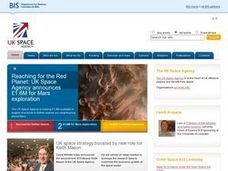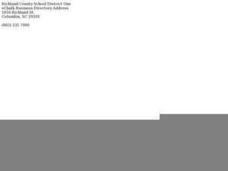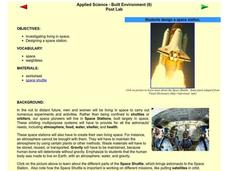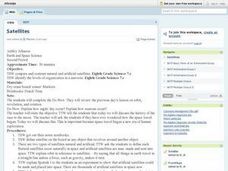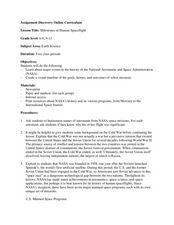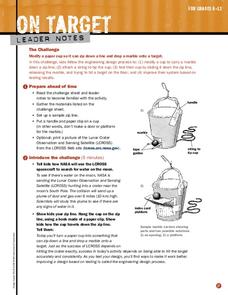Curated OER
Cryosat Mission
Beginning with general information on satellites and seasons, concluding with polar ice and the Cryosat Mission, this worksheet gives your earth scientists an opportunity to conduct some research. Most of the assignment consists of short...
NASA
Space Shuttle Glider
Your charges will enjoy putting together this model of the space shuttle and completing the three challenge activities described in the lesson. The worksheets embedded in the plan that pupils use to cut out their gliders are beautifully...
University of Colorado
Spacecraft Speed
Space shuttles traveled around Earth at a speed of 17,500 miles per hour, way faster than trains, planes, or automobiles travel! In the 13th installment of 22, groups graph different speeds to show how quickly spacecraft move through...
Curated OER
Milestones in the Space Program
Students brainstorm names of astronauts from NASA space missions. They are explained that the Cold War was not actually a war but pervasive tension that existed between the United States and the Soviet Union for several decades...
Curated OER
Satellites and the Radiation Budget
Students engage in a prelab discussion about the earth's radiation budget and global warming. They use "trading cards" to find specific websites to research radiation budget questions.
Curated OER
Recreating A Mission
Students role-play a satellite recovery mission. They explain and appreciate the complexity and planning involved in carrying out a shuttle mission.
Curated OER
Space Exploration Missions
Eighth graders explore and discuss the various space exploration missions. In this space mission lesson students work in pairs and create a PowerPoint presentation on the contributions of space exploration missions.
Curated OER
Design a Space Station
Sixth graders investigate living in space. In this science lesson, 6th graders discuss what it is like to live in space and create their own space station or space city of the future.
Curated OER
Team Moon
Students read "Team Moon: How 400,000 People Landed Apollo 11 on the Moon," by Catherine Thimmesh. They watch portions of the movie "Apollo 13." Students use the internet and the attached study guide to discover specific information...
Curated OER
Satellites
Eighth graders explore the history of space travel and satellites. Through a teacher demonstration, 8th graders observe how a satellite revolves another object. They identify natural and artificial satellites, explore how satellites...
Curated OER
once and future MOON
Beyond the phases of the moon, this comprehensive lesson plan covers geologic history and geology. Amateur astronauts examine photos of the lunar landscape, experiment with the creation of craters, and delve into information about the...
Curated OER
Milestones in Human Spaceflight
Students investigate the history and goals of NASA and human spaceflight. For this space science lesson, students answer questions about one of seven manned space programs and print pictures from the mission. As a...
Curated OER
Solar System: Uranus
Students research Uranus and its geological formation, atmosphere, magnetic field, satellites, and rings.
Curated OER
Our Eye in the Sky: The TIROS Weather Satellite
Students investigate the political context of the creation of a weather satellite. In this technology and society lesson plan, students explore the historical, technological, and political context of the TIROS weather satellite. They...
Curated OER
Impact Craters: Holes in the Ground!
Students simulate crater formation through a lab activity. In this space science lesson, students calculate how much energy is transferred during meteorite impact. They identify different factors affecting the size and depth of craters...
Curated OER
Introduction To Orbital Mechanics
Young scholars use NASA drawings to build a model satellite for a specific mission. They design a set of drawings for their satellite showing its subsystems as well.
Curated OER
Space Trading Cards
Students use the Internet and other reference sources to gather information on a space topic. They create a trading card displaying the information learned and import pictures from libraries and the Internet.
Curated OER
Introduction to the e-Mission Operation Montserrat
Students read and discuss short articles which "brief" them on the coming mission. After they read each of the articles, they discuss the main ideas and the requirements for mission training. This is an introductory lesson to a...
University of Colorado
Distance = Rate x Time
Every year, the moon moves 3.8 cm farther from Earth. In the 11th part of 22, classes use the distance formula. They determine the distance to the moon based upon given data and then graph Galileo spacecraft data to determine its movement.
NASA
On Target
NASA's LCROSS mission is dropping a probe into a lunar crater. Groups design a system to travel down a zip line and drop a marble onto a target in the classroom. The groups then modify their designs based upon testing.
Curated OER
Life in the Freezer
In this global warming worksheet, climatologists examine a few possible results of climate change. There is no specific reading from which learners extrapolate the information needed to answer the questions, so you will need to preface...
Curated OER
Measuring Precipitation
A little engineering design is mixed into this lesson on precipitation measurement. Groups plan and construct a rain gauge, and use it to collect precipitation. As part of the PowerPoint presentation, learners view a satellite map of...
Curated OER
Canada's Role in Astronomy and Space Science
Ninth graders, in groups, research a Canadian astronaut, developing a profile of their astronaut for presentation in a learning center. They visit the other groups' centers to explore more astronauts.
Curated OER
The Moons of Jupiter
Seventh graders study the moons of Jupiter. In this space science lesson, 7th graders plot the density and diameter of the Galilean satellites on the chart. Students then hypothesize about the composition and trends for distance for the...
